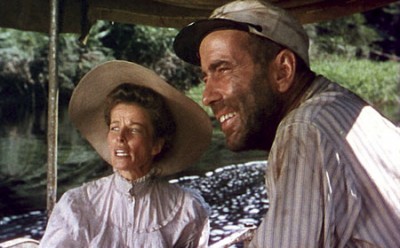After her brother's death, English missionary Rose Sayer (Katharine Hepburn) and Canadian riverboat pilot Charlie Allnut (Humphrey Bogart) flee German East Africa. The First World War has broken out, and they are behind enemy lines. Aboard Charlie's boat, the African Queen, Rose devises a plan to thwart a German gunboat downriver by outfitting the Queen as a floating torpedo and ramming the Germans. Charlie is reluctant; the plan is suicidal. Rose maintains her commitment to the mission, however, and Charlie finally relents. From this point forward, the story follows Charlie and Rose as they travel downriver, encounter a number of rapids and other dangers, and fall into a tentative romance. Tension therefore develops along parallel lines; as the objective of their explosive plot grows nearer, so do the two leads to one another.
I should admit that although I like The African Queen, there are a lot of people who will like it more than I do. There is no doubt that it's charming and consistently engaging, but in the end, it feels like John Huston-lite. Huston's films are often challenging, even from a contemporary perspective, and they are marked by strong writing, memorable characters, and propulsive, economic direction. While much of that is true in The African Queen, its story is ultimately too thin to sustain this ambitiously-mounted film. This script, credited to Huston and James Agee, is skillful, and maintains a good balance of character development, humor, and suspense. Perhaps what prevents the movie from reaching the higher plateaus of Huston's best films (like The Treasure of the Sierra Madre and The Maltese Falcon), is a lack of edge, and the fact that, although we like the characters here, they lack depth. There isn't much mystery as to who they are and what they want out of life. This renders the film's narrative arc kind of flat; onscreen danger can't compete with the metaphysical suspense of not knowing what a character may say or do next.
It's not news that The African Queen was a troubled production. Co-writer and director John Huston turned the film into a personal challenge to his own masculinity; uncredited co-writer Peter Viertel memorably fictionalized this in his novel (and later, screenplay) White Hunter, Black Heart (adapted to film by Clint Eastwood in 1990). The production difficulties are also well documented in the supplemental material included here. Given all that the cast and crew went through, it's amazing that the final film is as memorable and moving as it is. The leads were put through the wringer, but were able to deliver indelible portrayals nonetheless.
Hepburn and Bogart are well-matched. Hepburn's repressed, uptight old maid is somewhat more in her comfort zone than Bogart's squirrelly, ragged Allnut. Hepburn's performance is probably the more convincing of the two, even though Bogart won the Oscar. She exudes a buttoned-up comportment and contained Puritanical attitude that likely derives much from Hepburn's own Northeastern family background. Bogart, however, is playing against type as the screwy Allnut. He's primarily a comic character, a friendly, unsophisticated slob. Bogart is likable in the role; his metamorphosis from brooding loner into the gregarious Allnut is sure to have won over conservative oldsters at the Academy. But one can't help notice how hard he acts in the role; we are constantly being reminded that this is Bogart playing against type. It's an inescapable distraction. It's not a bad performance, just a very visible one.
Still, the leads generate a pleasing dynamic, and their budding romance is relatively believable. It is the heart of the movie, which, as it progresses, piles on a host of photographic techniques in order to keep the story credibly placed on an African river in 1914. The Technicolor photography by the great Jack Cardiff is excellent. The production design is brilliant. Studio shots and location footage are seamlessly matched. The restoration job highlights all of this wonderfully.


No comments:
Post a Comment